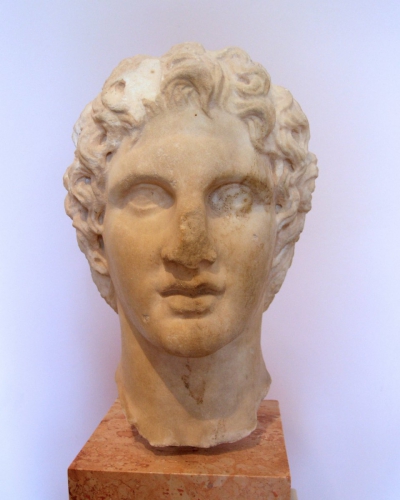The Battle of Gaugamela (; Greek: , romanized: Gavgmila), also called the Battle of Arbela (Greek: , romanized: rvila) took place in 331 BC between the forces of the Army of Macedon under Alexander the Great and the Persian Army under King Darius III. It was the second and final battle between the two kings, and is considered to be the final blow to the Achaemenid Empire, resulting in its complete conquest by Alexander.The fighting took place in Gaugamela, which literally meant "The Camel's House", a village on the banks of the river Bumodus. The area today would be considered modern-day Erbil, Iraq according to Urbano Monti's world map. Alexander's army was heavily outnumbered and modern historians say that "the odds were enough to give the most experienced veteran pause". Despite the overwhelming odds, Alexander's army emerged victorious due to the employment of superior tactics and the clever usage of light infantry forces. It was a decisive victory for the League of Corinth, and it led to the fall of Achaemenid Empire and of Darius III.
Alexander III of Macedon (Greek: Ἀλέξανδρος Alexandros; 20/21 July 356 BC – 10/11 June 323 BC), commonly known as Alexander the Great, was a king of the ancient Greek kingdom of Macedon. He succeeded his father Philip II to the throne in 336 BC at the age of 20, and spent most of his ruling years conducting a lengthy military campaign throughout Western Asia and Northeastern Africa. By the age of thirty, he had created one of the largest empires in history, stretching from Greece to northwestern India. He was undefeated in battle and is widely considered to be one of history's greatest and most successful military commanders.
During his youth, Alexander was tutored by Aristotle until the age of 16. His father Philip was assassinated in 336 BC at the wedding of Cleopatra of Macedon, Alexander's sister, and Alexander assumed the throne of the Kingdom of Macedon. In 335 BC he campaigned in the Balkans, reasserting control over Thrace and Illyria before sacking the Greek city of Thebes. Alexander was then awarded the generalship of Greece. He used his authority to launch his father's pan-Hellenic project, assuming leadership over all the Greeks in their conquest of Persia.In 334 BC he invaded the Achaemenid Empire (Persian Empire) and began a series of campaigns that lasted 10 years. Following his conquest of Asia Minor (modern-day Turkey), Alexander broke the power of Persia in a series of decisive battles, including those at Issus and Gaugamela. He subsequently overthrew King Darius III and conquered the Achaemenid Empire in its entirety. At that point, his empire stretched from the Adriatic Sea to the Indus River. Alexander endeavored to reach the "ends of the world and the Great Outer Sea" and invaded India in 326 BC, achieving an important victory over King Porus at the Battle of the Hydaspes. He eventually turned back at the Beas River due to the demand of his homesick troops, dying in 323 BC in Babylon, the city he planned to establish as his capital. He did not manage to execute a series of planned campaigns that would have begun with an invasion of Arabia. In the years following his death, a series of civil wars tore his empire apart.
Alexander's legacy includes the cultural diffusion and syncretism which his conquests engendered, such as Greco-Buddhism and Hellenistic Judaism. He founded more than twenty cities that bore his name, most notably Alexandria in Egypt. Alexander's settlement of Greek colonists and the resulting spread of Greek culture resulted in Hellenistic civilization, which developed through the Roman Empire into modern Western culture. The Greek language became the lingua franca of the region and was the predominant language of the Byzantine Empire up until its end in the mid-15th century AD. Greek-speaking communities in central and far eastern Anatolia survived until the Greek genocide and the population exchange in the 1920s. Alexander became legendary as a classical hero in the mould of Achilles, featuring prominently in the history and mythic traditions of both Greek and non-Greek cultures. His military achievements and enduring, unprecedented success in battle made him the measure against which many later military leaders would compare themselves. Military academies throughout the world still teach his tactics.

 English
English  español
español  français
français  português
português  русский
русский  العربية
العربية  简体中文
简体中文 
